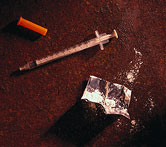

A needle-exchange program in Washington, D.C., has prevented hundreds of new HIV infections, a new study suggests.
The program for injection drug users was launched in 2007, and it prevented an estimated 120 new cases of HIV infection and saved about $44 million in HIV treatment costs within two years, the researchers said.
The findings were published online Sept. 3 in the journal AIDS and Behavior.
“Our study adds to the evidence that needle-exchange programs not only work, but are cost-effective investments in the battle against HIV,” Monica Ruiz, of George Washington University in Washington, D.C., said in a university news release. Ruiz is an assistant research professor in the department of prevention and community health at the university’s Milken Institute School of Public Health.
“We saw a 70 percent drop in newly diagnosed HIV cases in just two years. At the same time, this program saved the District millions of dollars that would have been spent for treatment had those 120 persons been infected,” she said.
Ruiz added that “the D.C. needle-exchange program continues to reduce the number of new cases of HIV among injection drug users in the city.”
The study authors explained that the needle-exchange program is relatively inexpensive at $650,000 a year, and provides injection drug users with more than just access to clean needles. People in the program can also get an HIV test, free condoms and access to a regular source of health care, including referrals for drug addiction treatment and tests that can detect other infectious diseases, such as hepatitis, according to background information in the news release.
Critics contend that needle-exchange programs encourage illegal drug use, but this study shows the benefits of such programs, the researchers said.
More information
AIDS.gov has more about substance abuse and HIV/AIDS.
Source: HealthDay
Copyright © 2024 HealthDay. All rights reserved.

Leave a Reply